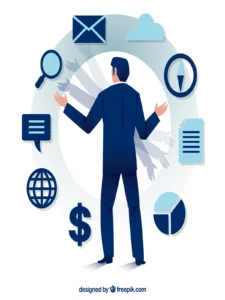AI in 2025: Breakthroughs Driving Industry Transformation and Autonomous Innovation
Artificial intelligence in 2025 is set to redefine industries by ushering in an era of unprecedented automation, autonomous decision-making, and innovation. Central to this transformation is agentic AI—intelligent systems capable of independently planning, reasoning, and executing complex multi-step workflows without continuous human oversight. This leap from passive assistance to autonomy is reshaping enterprise operations, product development, and customer engagement at scale.
This article examines the evolution of AI in 2025, explores cutting-edge trends in agentic AI, machine learning, and automation, and details how these advances are catalyzing industry transformation. It also highlights how Amquest Education’s Software Engineering, Agentic AI and Generative AI course prepares professionals to excel in this dynamic, AI-driven landscape.
The Evolution of AI Leading to 2025
AI has rapidly progressed from early rule-based systems to today’s generative models capable of producing text, images, and code. Initial AI adoption focused on augmenting human tasks—drafting emails, generating marketing copy, or answering FAQs—yielding incremental efficiency but limited strategic impact. The emergence of agentic AI marks a paradigm shift. Unlike passive tools, agentic AI systems possess agency: they autonomously plan, reason, and execute workflows across multiple steps to deliver outcomes without constant human intervention.
This evolution is enabled by breakthroughs such as:
- Enhanced model architectures featuring larger context windows and chain-of-thought reasoning, enabling deeper understanding and problem-solving
- Function calling capabilities that allow AI to dynamically invoke external tools and APIs
- Faster, smaller, and more efficient models that support real-time autonomous decision-making
Together, these advances position 2025 as a pivotal year for AI-driven transformation, where AI moves decisively from assistance to autonomy.
Latest Features, Tools, and Trends in AI in 2025
Agentic AI: The Autonomous Revolution
Agentic AI systems are revolutionizing industries by autonomously managing complex workflows. Their key capabilities include:
- Executing multi-step workflows autonomously: From scheduling and data analysis to complex decision-making across disparate systems
- Adaptive behavior: Dynamically responding to shifting environments and collaborating with humans and other AI agents
- Continuous monitoring and quality control: Detecting anomalies and fraud in real time, enhancing compliance and operational safety
These capabilities are driving productivity gains of up to 60% in sectors like finance and manufacturing by reducing manual effort and minimizing human error.
Advanced Machine Learning and Deep Learning Innovations
Machine learning models continue to advance in accuracy, efficiency, and scalability, propelled by:
- Self-supervised learning: Reducing reliance on labeled data by leveraging vast unlabeled datasets for pretraining
- Explainable AI (XAI): Enhancing transparency and trust by making AI decisions interpretable to stakeholders
- AI-powered analytics: Delivering actionable insights from massive datasets faster than ever before
These innovations support smarter automation and more informed decision-making, accelerating industry transformation.
Automation and Industry Transformation
AI-driven automation is evolving beyond repetitive tasks to:
- End-to-end process automation: Integrating AI agents across multiple systems and departments to streamline workflows
- Outcome-based business models: Shifting contracts and services toward performance metrics rather than fixed deliverables
- Sustainability and compliance: Leveraging AI to optimize resource usage and ensure regulatory adherence autonomously.
Addressing Risks and Governance in Agentic AI Deployment
While agentic AI offers transformative potential, it introduces new risks such as uncontrolled autonomy, lack of traceability, and operational complexity. Organizations must implement robust compliance frameworks and scalable architectures to mitigate these risks and maintain accountability.
Advanced Tactics for Success with AI in 2025
To harness AI breakthroughs effectively, organizations should:
- Invest in agentic AI platforms that enable autonomous action while integrating seamlessly with existing enterprise systems
- Leverage AI-powered analytics to uncover hidden patterns and optimize business strategies with data-driven insights
- Foster human-AI collaboration: Train teams to work alongside AI agents, elevating human creativity and strategic thinking rather than replacing it
- Implement continuous learning: Ensure AI models and workflows evolve with changing business needs and environments
These tactics unlock new revenue streams, competitive differentiation, and operational resilience.
The Power of Content, Storytelling, and Community in AI Adoption
Successful AI adoption hinges on sharing real-world success stories and fostering communities of practice. Organizations that:
- Share case studies demonstrating measurable AI impact
- Develop content that demystifies AI concepts for diverse stakeholders
- Build collaborative networks among practitioners, vendors, and customers accelerate enterprise AI adoption and cultivate the trust necessary for innovation.
Business Case Study: Siemens’ Manufacturing Transformation with Agentic AI
Siemens, a global industrial leader, faced challenges optimizing complex manufacturing workflows and maintaining equipment uptime. Manual monitoring caused delays in fault detection, impacting efficiency and costs. By deploying agentic AI agents to autonomously monitor machine data, predict maintenance needs, and optimize workflows without human intervention, Siemens achieved:
- 40% reduction in unplanned downtime
- 25% improvement in operational efficiency
- Significant cost savings within the first year
Additionally, the AI system’s collaboration with human engineers accelerated innovation cycles.
Why Choose Amquest Education’s Software Engineering, Agentic AI and Generative AI Course?
Amquest’s course is the premier pathway for professionals aiming to lead in AI’s future. Key strengths include:
- Comprehensive curriculum spanning software engineering principles, agentic AI architectures, and generative AI techniques
- Hands-on learning through real-world projects and AI-led modules that build practical skills
- Strong industry partnerships offering internships and placement support, especially via Amquest Mumbai and national online access
- Experienced faculty with deep industry backgrounds who bring current AI challenges and solutions into the classroom
- Focus on emerging trends like automation, AI-powered analytics, and enterprise AI adoption
This integrated approach balances theory, practice, and career outcomes, making it the ideal choice to master AI in 2025 and beyond.
Actionable Tips for Marketers to Leverage AI Breakthroughs
- Adopt AI-powered analytics tools to better understand customer behavior and optimize campaigns
- Automate repetitive marketing workflows with agentic AI to improve efficiency and reduce errors
- Create personalized content at scale by integrating generative AI models
- Monitor AI trends continuously to identify emerging tools that enhance marketing ROI
- Invest in upskilling teams through specialized courses like Amquest’s to build internal AI capabilities
These tactics help marketers stay competitive and transform customer engagement and business growth.
Measuring Success: Analytics and Insights
Tracking AI initiative impact requires focusing on:
- Operational metrics: Efficiency gains, cost reductions, and error rates
- Business outcomes: Revenue growth, customer satisfaction, and innovation velocity
- AI adoption metrics: User engagement with AI tools, model accuracy, and autonomous task completion rates
Combining these insights enables continuous refinement of AI strategies and maximizes ROI.
FAQs
What are the key artificial intelligence breakthroughs expected in 2025?
Key breakthroughs include the rise of agentic AI capable of autonomous decision-making, advances in machine learning such as self-supervised learning, and widespread automation transforming business processes.
How will machine learning evolve in 2025?
Machine learning will improve model efficiency, explainability, and integration with AI agents to enable smarter, faster, and more autonomous analytics and decision-making.
What role will automation play in industry transformation?
Automation will evolve from task-level to end-to-end process automation, enabling new business models and improving sustainability, compliance, and operational efficiency.
Why is agentic AI important for businesses?
Agentic AI enables businesses to automate complex workflows autonomously, improving productivity, quality control, and innovation while freeing human talent for strategic work.
How does the Software Engineering, Agentic AI and Generative AI course prepare professionals for AI in 2025?
The course offers a blend of software engineering, agentic and generative AI modules, hands-on projects, industry internships, and expert faculty, ensuring practical readiness for AI-driven roles.
What industries will be most impacted by AI breakthroughs in 2025?
Industries such as manufacturing, finance, healthcare, and customer service will experience major impacts through autonomous AI systems improving efficiency, compliance, and customer experience.
Take the next step in your AI journey today by exploring the Software Engineering, Agentic AI and Generative AI course and positioning yourself at the forefront of this revolution.





